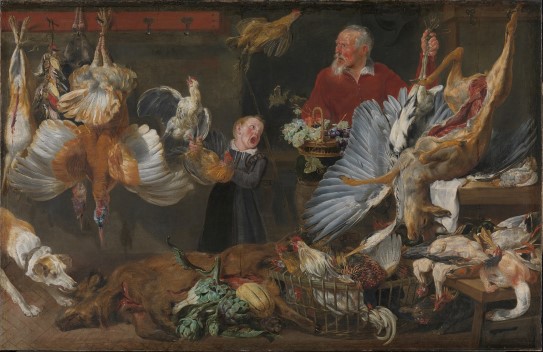A Game-seller’s stand
Frans Snyders
Transcription
Narrator:
The colonial era is underway and in cities such as Antwerp, people who have the money can enjoy both local and more exotic foods.
The mother of the painter Frans Snyders was a cook, and Snyders himself had a reputation as an eager consumer of both food and drink.
Perhaps Snyders’s mother was planning to serve a dish of roasted chaffinches. The birds – which would have been eaten whole – would have been bought from a game butcher like this one. Because here we see every kind of meat that could be required for a lavish meal – meat lying on the floor, meat hanging from hooks, and meat that’s still squawking or chirping.
Slaughtered and soon-to-be-slaughtered animals are all crammed together, on one stall after another.
What does a zoologist think about this? Here is Petter Bøckman from the Natural History Museum in Oslo:
Petter Bøckman:
This way of slaughtering animals here at the market, in these kinds of small, open-air abattoirs, was very unhygienic. This stall is selling game, of course, but if you were able to see the neighbouring stall, it might have been selling pigs and calves.
With the growth of larger cities, and with industrialization, these slaughtering practices declined and abattoirs were established precisely to solve the hygiene problem.
Narrator:
This game stall is in what nowadays we’d call a wet market: a traditional type of food market with slaughtered and soon-to-be slaughtered animals – both domesticated and wild – all in the same place.
Petter Bøckman:
The problem with modern wet markets is that populations today are much, much denser than they were in the past, and keeping these kinds of old traditions, in this case rather picturesque wet markets, in places with dense populations, is just asking for trouble. And very many of the serious problems with epidemics that we’ve had in recent years – bird flu and swine flu and MERS, and now of course Covid, as well as the Ebola outbreaks in Africa and Zika virus in South America and so on – they’ve all tended to originate in these wet markets.
All the major killer diseases in world history, things like the Black Death and tuberculosis and diphtheria and similar evils that have beset mankind, are diseases that were initially passed on to us from animals.